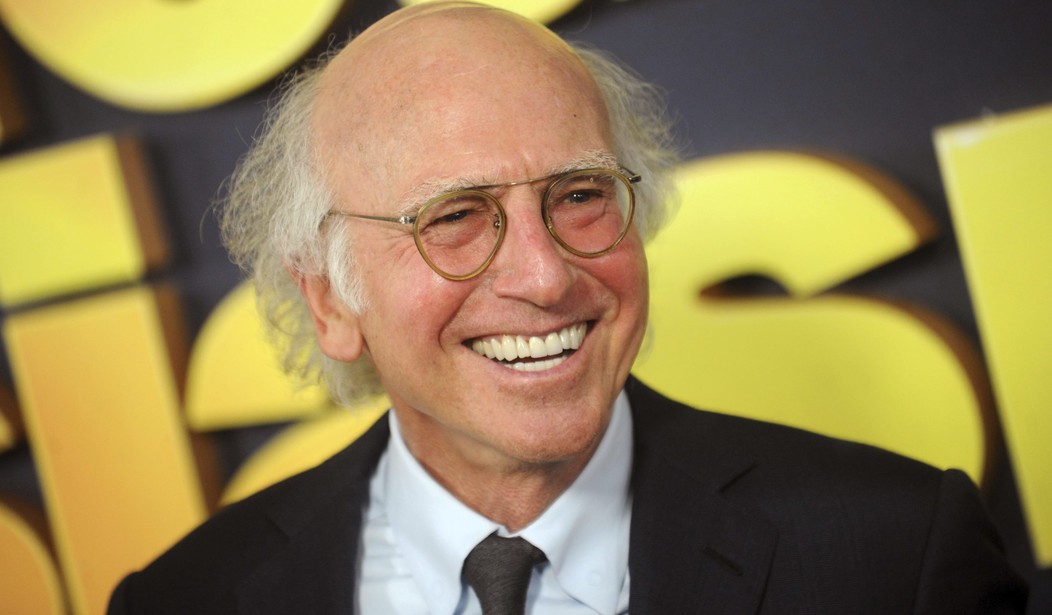Liberal Jews aren’t funny, not, at least, to Jews who know the jokes in their original form. I’ve never been able to watch more than thirty seconds of Seinfeld or Larry David, who put both feet in his mouth with this revolting bit of Saturday Night Live monologue:
“I’ve often wondered that if I grew up in Poland when Hitler came to power and I was sent to a concentration camp, would I still be checking out women? I think I would — ‘Hey, Shlomo, did you see that one by Barracks Eight? I’ve had my eye on her for weeks. I’d like to go up and say something to her. Of course, the problem is there are no good opening lines in a concentration camp.'”
There are in fact some very funny Auschwitz jokes. One is told by Rabbi Joseph Telushkin in his excellent book on Jewish humor. In the 1960s, a Jew in Moscow is tramping home from his Metro stop on a winter night when a Zil limousine screeches around the corner. A back door opens and a large package is ejected. He approaches the package and sees that it is a man, beaten to a pulp. He looks closer, and recognizes the victim–it’s Goldberg, whom he met in Auschwitz! “Goldberg,” he says, “it’s me, Levy, from Auschwitz.” A beatific smile comes over Goldberg’s face, and he sighs, “Ahhhh….Auschwitz!”
The point of the joke, of course, is that we survived Auschwitz. In the 1960s we didn’t know if we would survive Communism. Jewish survival is the moral vantage point from which we can joke about the worst horrors. Larry David’s “joke” is merely trivial, which is to say disgusting.
Or the one about the two Yeshiva students who sneak a peek at Nietzsche, who (in “The Birth of Tragedy”) quotes the legend of Selenus, the teacher of Dionysus. Captured by King Midas, the demigod is forced to reveal the secret of all wisdom: Best of all is never to have been born, and second best is to die quickly. “You know, Nietzsche is right,” says Moshe to Yankel. “Pain is so long, joy is so short, life is so hard, we’re better off if we never had been born.” Yankel replies, “But, Moshe, who has such luck? Not one in ten thousand.” The absurdity of the joke arises from the the fact that love of life that is so embedded in Jewish sensibility that Nietzsche’s nugget of Hellenistic nihilism is incomprehensible.
A favorite tells of the rabbinic court that is arguing over whether it is permissible to make coffee with a French press using pre-heated water on Shabbat, when cooking is forbidden. Three of the four rabbis rule in favor, but Rabbi Levine is the holdout. He exclaims, “I call on heaven to show me a sign that these rabbis are ignoramuses!” The sky darkens, lightning flashes, thunder peals, and a voice cries from heaven: “Levine is right!” The other rabbis say, “Now it’s three to two.”
In fact, the joke is adapted directly from a story in the Talmud in which Rabbi Eliezer, one of our sages of antiquity, enlists the support of heaven for his position. The other rabbis respond, “The Torah is not in heaven” (Deut. 30:12); God has given us the Torah so that we may be His partners. God chuckles to the angels afterwards: “My children have gotten the better of me.”
Here’s another: Esther says, “Abe, let’s go to the theater!” Abe replies, “I don’t want to go to the theater. It’s boring.” “What do you mean, ‘It’s boring’?”, Esther objects. “The theater is there because people want to be entertained! People go to the theater because it’s entertaining, and if it were boring, they wouldn’t go, and there wouldn’t be any theater–so how can it be boring?” Abe sighs, “It’s boring. When he wants, she doesn’t want. When she wants, he doesn’t want. And when they both want, it’s over.”
The Jewish struggle is to raise children as good Jews. We have no romantic stories which end with “and they lived happily ever after”; the courtship of Jacob and Rachel is a love story, to be sure, but it is the beginning, not the end. The story of Jacob’s sons, culminating in Judah’s offer to sacrifice himself for Benjamin in Joseph’s test, is the story to which the courtship is prelude.
Here’s another: During the Days of Awe before the Day of Repentance, Yom Kippur, the rabbi is meditating in the synagogue. He prays, “Lord, what is man, that thou takest knowledge of him! Or the son of man, that thou makest account of him! Man is like to vanity: his days are as a shadow that passeth away. Lord, I am as nothing in thy sight.” The cantor is moved, and he also prays, “Lord, what is man, that thou takest knowledge of him! Man is like to vanity: his days are as a shadow that passeth away. Lord, I am as nothing in thy sight.” And the janitor hears, and he is moved, and he starts to pray: “Lord, what is man, that thou makest account of him! Man is like to vanity: his days are as a shadow that passeth away. Lord, I am as nothing in thy sight.” The cantor nudges the rabbi and says, “Look who thinks he’s nothing in the sight of God!”
That is the great paradox: We are dust and ashes, our lives are fleeting, we are mown down like grass at the end of the day–yet we are important to God.
All characteristically Jewish humor has a profoundly religious foundation: It stems from the absurdity of the encounter of finite humanity with infinite divinity. To the extent that they are funny at all, liberal Jews reflect these paradoxes in one way or another. Most of Woody Allen’s work bores me, but occasionally he hits the mark. “It’s not that I’m afraid of death–I just don’t want to be there when it happens.” Or, “There is an unseen world–the only question is how late is it open and how far is it from midtown.”
There are plenty of jokes about Jews that could be told as easily about Greeks, Armenians, overseas Chinese, or other minorities who found an economic niche in trading. For example: The teacher asks 5-year-old Kostas/Tigran/Moishe, “How much is two plus two?” The kid responds, “Is that buying or selling?” There are stingy jokes about Jews that are told about Scotsmen. There is a special genre of Jewish American Princess jokes, the best of which are unsuitable for a family newspaper.
And there are jokes that depend on the Yiddish language, which has many gradations of expression about annoying people. The term “nudnik” has no equivalent in English or, to my knowledge, any other language: a bore and a pest whom you can’t get rid of. A man goes to a psychiatrist and says: “Doctor, I talk to myself!” The psychiatrist says, “That’s not necessarily a cause for concern. A lot of people talk to themselves.” The patient adds: “I’m a nudnik.” And there is the expression es soll gor nisht helfen, which means (in somewhat antiquated German dialect), “It won’t do any good,” or “Fuhgeddabouddit.”
And there is a genre of jokes that exploits the unlikelihood of encountering a Jew in certain situations. A girl touring Transylvania gets off at the wrong train stop. She finds herself in a deserted town. It starts to rain. She sees a ruined castle on a hill, goes inside, and finds an old four-poster bed with black velvet hangings. Exhausted, she goes to sleep there. She wakes up in the dark–and a menacing, shadowy figure approaches her. As the figure is almost upon her she brandishes a crucifix. The shape says, “Es soll gor nisht helfen.” The crucifix is no help against a Jewish vampire.
These are not religious jokes per se, but they emphasize the fact that Israel is a nation apart. Jews who abandon Judaism lose more than religion; they also lose the Jewish sense of humor, which arises from our paradoxical relationship to God. “According to Rabbi Bunim of P’shiskha, everyone should have two pockets, each containing a slip of paper. On one should be written: I am but dust and ashes, and on the other: The world was created for me. From time to time we must reach into one pocket, or the other. The secret of living comes from knowing when to reach into each.”










Join the conversation as a VIP Member